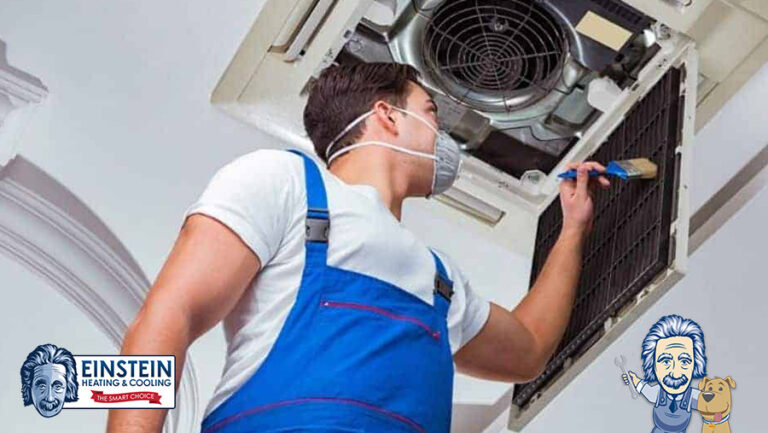
Improve the indoor air quality of your home or business with Einstein Heating and Cooling’s comprehensive indoor air quality solutions. Our expert team understands the importance of clean and healthy air for your well-being. We offer a range of solutions including air purifiers, humidifiers, dehumidifiers, and ventilation systems to remove pollutants, control humidity levels, and ensure fresh air circulation.
With our indoor air quality solutions, you can breathe easier and enjoy a healthier indoor environment. Contact Einstein Heating and Cooling today to enhance your indoor air quality and create a comfortable and safe space for you and your loved ones.
Are you concerned about the quality of the air you breathe indoors? Einstein Heating and Cooling is here to provide comprehensive indoor air quality solutions that will help you achieve a healthier and more comfortable living environment.
We understand the impact that poor indoor air quality can have on your health and overall well-being, which is why we offer a range of cutting-edge solutions to address common air quality issues.
Our team of experts is well-versed in the latest advancements in indoor air quality technology and can recommend the most suitable solutions for your specific needs. Whether you are dealing with allergens, dust, pet dander, volatile organic compounds (VOCs), or other airborne contaminants, we have the expertise and products to effectively mitigate these problems.
One of the key solutions we offer is air purification. Our advanced air purifiers are designed to remove a wide range of pollutants, including dust, pollen, mold spores, bacteria, and viruses. These purifiers utilize highly efficient filters and advanced purification technologies to ensure that the air you breathe is clean, fresh, and free from harmful particles.
Humidity control is another crucial aspect of maintaining optimal indoor air quality. Excess moisture can lead to mold growth, while insufficient humidity levels can cause discomfort and respiratory issues.
Our team can install and maintain humidifiers and dehumidifiers to help you achieve the ideal humidity level in your space, promoting a healthier and more comfortable indoor environment.
Inadequate ventilation is a common issue in many buildings, leading to stale air and an accumulation of pollutants. We offer ventilation solutions that ensure proper air circulation, removing stagnant air and replacing it with fresh outdoor air. This not only improves indoor air quality but also helps regulate temperature and reduce odors.
At Einstein Heating and Cooling, we prioritize personalized service and take the time to understand your specific indoor air quality concerns.
Our experts will conduct a thorough assessment of your property, taking into account factors such as the size of the space, existing ventilation systems, and potential sources of pollutants. Based on this assessment, we will recommend tailored solutions that address your unique needs and provide the most effective results.
By investing in our indoor air quality solutions, you can enjoy a range of benefits. Improved air quality promotes better respiratory health, reduces allergy symptoms, enhances sleep quality, and creates a more comfortable living environment.
Additionally, by removing harmful pollutants, you can create a safer space for children, elderly individuals, and those with respiratory conditions.
When it comes to indoor air quality solutions, you can trust Einstein Heating and Cooling to deliver exceptional service and top-of-the-line products.
Our team is committed to your satisfaction and strives to exceed your expectations. We offer reliable installations, thorough maintenance services, and prompt repairs to ensure that your indoor air quality solutions continue to operate at their best.
Take the first step towards breathing cleaner and healthier air in your home or business. Contact Einstein Heating and Cooling today to learn more about our indoor air quality solutions and schedule a consultation with our experts. Together, we can create a healthier and more comfortable indoor environment for you and your loved ones.
Indoor air quality is an essential aspect of creating a healthy living or working environment. Indoor air pollutants such as pollen, mold spores, dust, and volatile organic compounds (VOCs) can cause health problems ranging from headaches and allergies to respiratory diseases and cancer. Air purifiers, filtration systems, humidifiers, dehumidifiers, and ventilation systems are effective solutions to improve indoor air quality and create a healthier living or working environment.
Before installing any indoor air quality system, it is crucial to assess the indoor air quality of the building. The assessment will help identify the pollutants present in the air, the sources of the pollutants, and the best solution to improve indoor air quality. There are different ways to assess indoor air quality, including:
Air purifiers are devices that remove pollutants from the air. There are different types of air purifiers, including HEPA filters, activated carbon filters, and UV-C light purifiers. HEPA filters are the most common type of air purifier and are effective at removing airborne particles such as dust, pollen, and mold spores.
The installation of air purifiers involves selecting the appropriate type of air purifier based on the assessment of indoor air quality and installing it in the appropriate location. The size and number of air purifiers required will depend on the size of the building and the level of pollutants present in the air.
Filtration systems are designed to remove particles and pollutants from the air. They are installed as part of the HVAC system and work by filtering the air as it circulates through the system. There are different types of filtration systems, including mechanical filters, electronic filters, and hybrid filters.
The installation of filtration systems involves selecting the appropriate type of filter based on the assessment of indoor air quality and installing it in the HVAC system. The size and type of filter required will depend on the size of the building and the level of pollutants present in the air.
Humidifiers are devices that add moisture to the air. Low humidity levels can cause dry skin, itchy eyes, and respiratory problems. Humidifiers are particularly useful in areas with dry climates or during the winter months when indoor heating can cause the air to become dry.
The installation of humidifiers involves selecting the appropriate type of humidifier based on the assessment of indoor air quality and installing it in the appropriate location. The size and number of humidifiers required will depend on the size of the building and the level of humidity required.
Dehumidifiers are devices that remove moisture from the air. High humidity levels can cause mold growth, musty odors, and respiratory problems. Dehumidifiers are particularly useful in areas with high humidity levels or during the summer months when indoor cooling can cause the air to become humid.
The installation of dehumidifiers involves selecting the appropriate type of dehumidifier based on the assessment of indoor air quality and installing it in the appropriate location. The size and number of dehumidifiers required will depend on the size of the building and the level of humidity required.
Ventilation systems are crucial for maintaining indoor air quality by bringing fresh air into the building and removing stale air. There are different types of ventilation systems, including natural ventilation, mechanical ventilation, and hybrid ventilation.
Natural ventilation involves using natural air flow to circulate air in and out of the building. This can be achieved through the use of windows, doors, and vents. However, natural ventilation can be limited in areas with high pollution levels or in buildings with poor ventilation design.
Mechanical ventilation involves using mechanical systems such as fans and ducts to circulate air in and out of the building. There are different types of mechanical ventilation systems, including exhaust ventilation, supply ventilation, and balanced ventilation.
Exhaust ventilation works by removing stale air from the building, while supply ventilation works by bringing fresh air into the building. Balanced ventilation works by combining both exhaust and supply ventilation to create a balanced flow of air in and out of the building.
Hybrid ventilation is a combination of natural and mechanical ventilation. This system uses natural air flow when outdoor conditions are favorable and mechanical ventilation when outdoor conditions are unfavorable.
The installation of ventilation systems involves selecting the appropriate type of ventilation system based on the assessment of indoor air quality and installing it in the appropriate location. The size and type of ventilation system required will depend on the size of the building and the level of pollutants present in the air.
Proper maintenance of indoor air quality systems is crucial for ensuring their effectiveness and longevity. Regular maintenance should include cleaning and replacing filters, checking and repairing any leaks or malfunctions in the system, and monitoring indoor air quality to ensure that the system is functioning as intended.
In conclusion, air purifiers, filtration systems, humidifiers, dehumidifiers, and ventilation systems are effective solutions to improve indoor air quality and create a healthier living or working environment. The installation of these systems should be based on an assessment of indoor air quality, and their effectiveness should be regularly monitored through proper maintenance. Improving indoor air quality is essential for maintaining a healthy and productive living or working environment.
Are you ready to transform your entrepreneurial aspirations into a tangible venture and embrace the exciting realm of franchise ownership? With a few decisive moves, you could be on the fast track to extraordinary success. Don’t hesitate any longer; embark on your path to becoming the proud boss of your very own business today!
